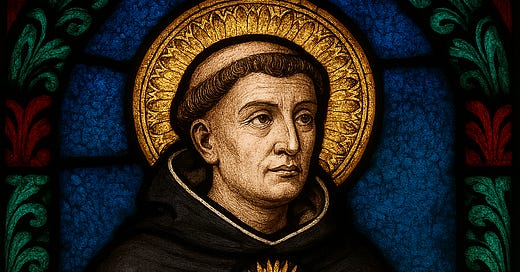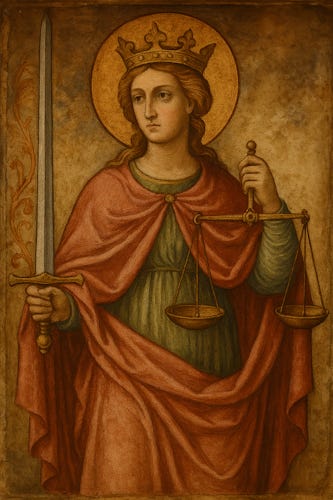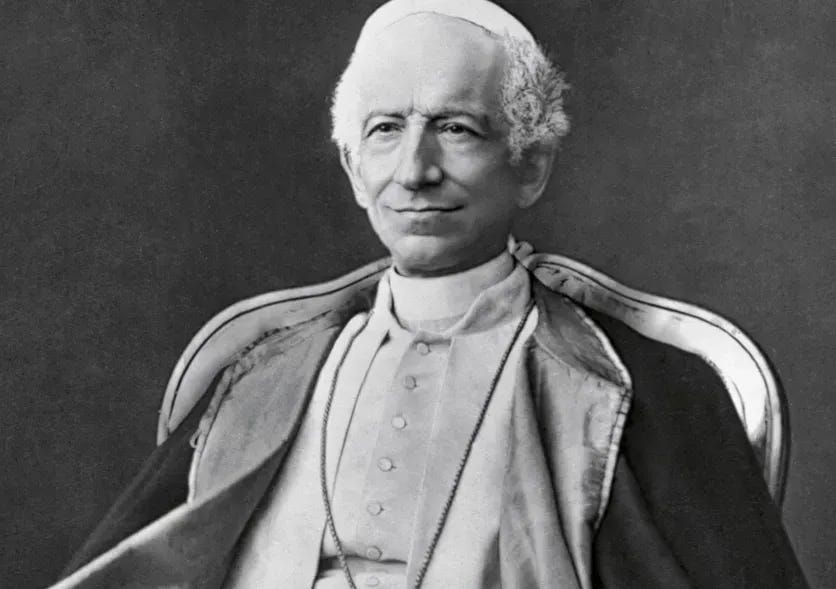The Foundation of Rights: A Catholic Response to Modern Confusion
How St. Thomas Aquinas and Pope Leo XIII Provide Clarity Where Contemporary Philosophy Fails
I came across a fascinating philosophical exchange between podcaster Tim Pool and Andrew Wilson wrestling with a question that has plagued political philosophy for centuries: What are rights, and where do they come from?1 Their conversation, while intellectually honest, reveals the profound confusion that results when we abandon the rich tradition of Catholic moral philosophy in favor of modern alternatives.
Watching Pool struggle to ground rights in anything beyond circular appeals to human survival, while Wilson reduces them to mere expressions of force, one can't help but think: If only they had read Aquinas.
The Modern Predicament
The exchange perfectly illustrates the intellectual crisis of our age. Pool, representing a pragmatic libertarian thought influenced by secular humanism, initially argues that rights are "entitlements absent duty" grounded in what humans need to survive. This libertarian appeal to "entitlements absent duty" echoes the contractarian assumptions of thinkers like Locke or Mill2, who ground rights in individual consent or utility rather than the objective moral order. When pressed by Wilson on why human survival is inherently good, Pool finds himself trapped in circular reasoning: we need rights to survive, and we need to survive to have rights.
Wilson, more philosophically sophisticated, recognizes this circularity and cuts to the chase: rights are simply what you can defend with force. In his view, without the power to enforce them, rights are meaningless abstractions. Both men eventually acknowledge they need some transcendent grounding and invoke God, but remain confused about the relationship between divine authority, human nature, and moral obligation.
Their confusion is understandable. Cut off from twenty centuries of careful Catholic reflection on these questions, modern thinkers find themselves reinventing wheels that were perfected long ago, and usually doing so poorly.
The Thomistic Foundation
St. Thomas Aquinas, synthesizing Aristotelian philosophy with Christian revelation, provides a far more coherent account of rights (jus)3 that resolves the tensions evident in the Pool-Wilson debate. For Aquinas, rights flow naturally from the moral order established by God and discernible through reason.
The Angelic Doctor begins not with abstract entitlements or force, but with human nature itself. Humans, created in the image of God4, possess a rational nature ordered toward specific ends: union with God, life in community, the pursuit of truth, and the raising of families. Because we are rational beings, we can discern through Natural Law5 what conduces to these ends and what frustrates them.
Rights, in the Thomistic understanding, are not arbitrary entitlements but moral powers6; these are legitimate claims that flow from our nature and our calling. They exist because human beings have inherent dignity as rational creatures made for communion with the Divine. They are not granted by governments, earned through force, or negotiated through social contracts. They are discovered through reason reflecting on the requirements of human flourishing.
This immediately resolves Pool's circularity problem. We don't need rights merely to survive biologically (as Pool initially argued) but to live in accordance with our rational nature. Aquinas, by contrast to the libertarian tradition, roots rights in the divine design of human nature, avoiding the instability of subjective agreements or utilitarian calculations. The good of human life isn't arbitrary; it is grounded in the objective reality of what we are: creatures made by God for eternal happiness, achieving our temporal fulfillment through the exercise of our rational and social nature.
Rights and Duties: Two Sides of the Same Coin
Pool's confusion about the relationship between rights and duties also finds clarity in Thomistic thought. For Aquinas, every right has a corresponding duty, and every legitimate duty creates correlative rights. This isn't a contradiction but a reflection of the social nature of human beings.
My right to life corresponds to others' duty not to kill me unjustly. My right to property7 corresponds to others' duty to respect my legitimate possessions. My right to worship God corresponds to others' duty not to impede my pursuit of divine truth. The parent's authority over the child corresponds to the child's duty of obedience and the parent's duty to seek the child's good.
This elegant reciprocity reflects the fact that human beings achieve their ends not in isolation but in community. Rights aren't abstract entitlements floating free of social context, but concrete moral realities that emerge from our relationships and obligations to one another.
Wilson's error lies in collapsing this moral reality into mere force. While Wilson equates rights with force, Catholic teaching recognizes force as a necessary but subordinate tool for defending the moral order. Aquinas, in Summa Theologiae II-II, q. 408, justifies the use of force in just wars or lawful governance, but only as a means to uphold the Natural Law, not as the foundation of rights themselves. While it's true that rights often require force to protect them in our fallen world, this doesn't mean that rights are force any more than the fact that we need police to protect property means that property rights are identical to police power. Traditional Catholicism acknowledges the necessity of force in a fallen world, but subordinates it to the moral order; force serves justice, not the reverse.
Leo XIII and the Social Teaching
Pope Leo XIII, in his encyclical Rerum Novarum (1891)9, developed these Thomistic insights in response to the social upheavals of the Industrial Revolution. Faced with both socialist collectivism and laissez-faire individualism10, Leo provided a third way grounded in Catholic social doctrine.
Leo affirmed that rights flow from human dignity, but insisted they must be understood within the context of our social nature and ultimate destiny. The right to private property, for instance, is grounded not in mere convention or force, but in human dignity and the requirements of family life. Yet this right is limited by the universal destination of goods11 and the demands of social justice.
Leo was wise in recognizing that rights without corresponding duties become mere selfishness, while duties without corresponding rights become oppression. The employer has a right to honest labor from his workers, but a duty to pay a just wage12. The worker has a right to just compensation, but a duty to provide honest work. The state has authority to coordinate the common good, but must respect the legitimate autonomy of individuals and intermediate institutions.
This organic understanding of rights and duties, grounded in both Natural Law and divine revelation, provides exactly what the Pool-Wilson debate lacked: a coherent account of where rights come from, how they relate to one another, and why they make claims on our conscience.
Natural Law and the Modern Crisis
The conversation between Pool and Wilson illustrates perfectly why John Paul II identified moral relativism13 as one of the gravest threats to human dignity in our time. When we abandon objective moral truth discoverable through reason (Natural Law), we inevitably fall into either arbitrary subjectivism or crude materialism.
Pool's initial position, that rights derive from survival needs, reflects the utilitarian reduction of the human person to a bundle of desires or biological imperatives. On the other hand, Wilson's position, that rights are reducible to force, reflects the nihilistic conclusion that follows when we abandon objective moral standards altogether.
Both errors stem from the same source: the rejection of human nature as a normative reality14. For the classical tradition, human nature isn't merely descriptive (what we happen to do) but normative (what we are called to become)15. We discover our rights and duties by understanding what we are and what we are for.
Modern philosophy, having rejected formal and final causality, can only understand human beings mechanistically; as complex machines bumping into one another rather than as rational agents, created in God’s image, called to participate in eternal truth and goodness. This reductionist anthropology, echoing Satan’s rebellious ‘non serviam’ by denying the divine order of Natural Law, manifests in the woke phenomenon’s relativism, which exalts subjective identity or ideological conformity over objective Truth. The result is either collectivist tyranny, where individuals are sacrificed to abstract social agendas, or individualist chaos, where each person becomes a law unto themselves, undermining the common good and human dignity.
The Political Implications
These philosophical differences have profound political consequences. A society that understands rights as flowing from human dignity grounded in the Natural Law will structure itself very differently from one that sees them as either arbitrary preferences or expressions of power.
In the Catholic understanding, the state's authority is real but limited. Government exists to coordinate the common good16 and protect the natural rights that flow from human dignity. But precisely because these rights are grounded in nature rather than convention, they limit governmental power absolutely. The state cannot legitimately violate the Natural Law any more than it can repeal the law of gravity.
This provides a much more solid foundation for constitutionalism17 than either liberal contractarianism or conservative traditionalism18. Rights aren't protected because we happen to prefer them (which could change) or because they're traditional (which can be overthrown), but because they reflect the permanent moral structure of reality.
At the same time, this understanding avoids the libertarian error of treating rights as absolute. Because rights flow from our nature as social beings ordered toward God, they must be exercised in ways that respect the rights of others and serve the common good. My right to free speech doesn't extend to libel or incitement to violence. My right to property doesn't authorize me to use my wealth in ways that undermine the moral fabric of society.
Beyond the Secular Impasse
Perhaps most importantly, the Thomistic understanding of rights provides a path beyond the sterile secular debates that dominate contemporary politics. Rather than endlessly arguing about whether rights come from God or nature, consent or force, tradition or reason, we can recognize that these apparent alternatives are false dichotomies.
Rights come from God through nature, discovered by reason and recognized by just authority. They are both traditional (reflecting the permanent structure of human nature) and rational (accessible to philosophical reflection19). They require both individual responsibility and social support, both personal virtue and just institutions.
This integration reflects the Catholic principle that grace builds upon nature20. The Natural Law, discoverable through reason, provides a solid foundation for political life that believers and non-believers can share. But for Christians, this natural foundation is elevated and perfected by divine revelation, which clarifies what reason can discover and reveals the ultimate destiny toward which all human rights and duties are ordered.
An Invitation to Wisdom
The Pool-Wilson debate, for all its limitations, performed a valuable service by forcing viewers to confront questions they had likely never considered deeply. In our therapeutic age, we're more accustomed to discussing our feelings about rights than examining their rational foundations.
But their struggle also illustrates the poverty of contemporary intellectual resources. Brilliant minds, working without the benefit of the great tradition, find themselves trapped in false dilemmas and circular arguments that were resolved centuries ago.
The Catholic intellectual tradition doesn't provide easy answers to every political question, but it does provide the right questions and a solid framework for approaching them. In an age of ideological polarization and philosophical confusion, perhaps it's time to rediscover the wisdom of ages past.
As Pope Leo XIII wrote in Aeterni Patris (1879)21, his encyclical calling for a return to Thomistic philosophy: "Far from being hostile to the advance of learning or impediment to the development of science, this philosophy rather encourages and promotes both in many ways."
The same could be said for political wisdom. Rather than constraining our thinking about rights and duties, the Natural Law tradition liberates us from the narrow alternatives that trap so many contemporary debates. It offers not just intellectual clarity, but hope: the hope that politics can be something more than a war of all against all, and that human society can reflect, however imperfectly, the justice and peace of the City of God22.
In a world where brilliant podcasters find themselves philosophically adrift, perhaps it's time to set sail with better charts; maps drawn by saints and sages who charted these waters long before us, and who offer to guide us still.
God Bless and protect you! +DEM
Timcast IRL, YouTube
For the contractarian tradition, see John Locke’s Two Treatises of Government (1689), which grounds rights in individual consent to a social contract, relying on a deistic natural law that prioritizes autonomy over the common good. For the utilitarian tradition, see John Stuart Mill’s On Liberty (1859), which bases rights on calculations of societal happiness, reducing moral truth to subjective outcomes. Both approaches diverge from the objective moral order of Thomistic Natural Law, which roots rights in human nature’s divine purpose, as articulated by St. Thomas Aquinas and clarified by the Church’s magisterium.
St. Thomas Aquinas, Summa Theologiae, II-II, q. 58, a. 1.
Summa Theologiae, I, q. 93, a. 6.
For Aquinas’s development of Natural Law theory, see Summa Theologiae, I-II, qq. 90–94, especially q. 94, a. 2, where he explains how the precepts of Natural Law correspond to human inclinations: preservation of life, procreation and education of offspring, and the pursuit of truth about God and life in society. These precepts, rooted in the imago Dei (Summa Theologiae, I, q. 93, a. 6) and participating in God’s eternal law (q. 91, a. 2), provide an objective basis for rights as moral claims, resolving the circularity of Pool’s utilitarianism and the nihilism of Wilson’s force-based view.
The concept of moral powers (jus or potestates morales), as legitimate claims inherent to human nature, was developed by later Thomistic scholars building on Aquinas’s concept of justice (Summa Theologiae, II-II, q. 58, a. 1) and Natural Law (Summa Theologiae, I-II, q. 94, a. 2). See Francisco Suárez, De Legibus, Book I, c. 5, where he defines jus as a moral faculty grounded in the human dignity of the imago Dei (Summa Theologiae, I, q. 93, a. 6), reflecting the Eternal Law and offering a coherent alternative to the secular errors of utilitarianism and pragmatism.
Summa Theologiae, II-II, q. 66, a. 2.
Summa Theologiae, II-II, q. 40.
Pope Leo XIII, Rerum Novarum (1891), §6: "Every man has by nature the right to possess property as his own. This is one of the chief points of distinction between man and the animal creation."
For Leo XIII's critique of both socialism and laissez-faire capitalism, see Rerum Novarum, §§4-12 (on socialism) and §§3, 35-38 (on economic liberalism).
The concept of the universal destination of goods (destinatio universalis bonorum), rooted in Aquinas’ teaching that goods are common in extreme necessity (Summa Theologiae, II-II, q. 66, a. 2), holds that while private property is legitimate, all goods are ultimately ordered toward meeting human needs according to human dignity as bearers of God’s image (Summa Theologiae, I, q. 93, a. 6). See Pope Leo XIII, Rerum Novarum (1891), nos. 7–8, and maintained even by the postconciliar Catechism of the Catholic Church, nn 2402–2406, which articulate this principle as reflecting God’s eternal law, balancing the right to property with the duty to serve the common good and contrasting with utilitarian or force-based views of rights.
Rerum Novarum, §20: "The following duties bind the wealthy owner: first, to obtain his wealth justly; second, to use it properly; third, to distribute it liberally for the benefit of others, especially the poor."
John Paul II, Veritatis Splendor (1993), §32: "Certain currents of modern thought have gone so far as to exalt freedom to such an extent that it becomes an absolute, which would then be the source of values."
The distinction between formal and final causality, central to Aristotelian-Thomistic philosophy, was largely rejected by modern philosophy beginning with Francis Bacon and René Descartes.
Summa Theologiae, I-II, q. 94, a. 2. This underscores that human nature is normative, as its inclinations are not arbitrary but directed by God’s rational order.
Summa Theologiae, I-II, q. 90, a. 4.
The principle of subsidiarity, while not explicitly named by Leo XIII, is implicit in Rerum Novarum and was formally articulated by Pope Pius XI in Quadragesimo Anno (1931).
Pope Leo XIII, Immortale Dei (1885), §6: "The sovereignty of the people, however, and this without any reference to God, is held to reside in the multitude; which is doubtless a doctrine exceedingly well calculated to flatter and to inflame many passions, but which lacks all reasonable proof, and all power of insuring public safety and preserving order."
Natural Law theory provides common ground for believers and non-believers because it is accessible to reason. See St. Thomas Aquinas, Summa Theologiae, I-II, q. 91, a. 2, where Natural Law is defined as the rational creature’s participation in the eternal law.”
Summa Theologiae, I, q. 1, a. 8, ad 2: "Grace does not destroy nature but perfects it." This principle (gratia non tollit naturam sed perficit) is fundamental to Catholic integration of reason and faith; offering a coherent moral foundation for all, unlike secular relativism.
See Pope Leo XIII, Aeterni Patris (1879), §17, where Thomistic philosophy is praised for harmonizing faith and reason, providing a rational foundation for moral truth that counters the relativism and mechanistic anthropology of modern thought, as seen in secular debates like those of Pool and Wilson.
St. Augustine, De Civitate Dei, Book XIX, Chapter 17: Augustine's vision of earthly peace as an imperfect reflection of divine peace provides the theological foundation for Catholic political philosophy's integration of temporal and eternal concerns.












Thanks! An Argentinian politician would say of Tim P. “This kid has good ideas but doesn’t think well” 😁
He uses that expression frequently to point the lack of basic principles and coherent reasoning on most people today.